

In the modern world, stress and increased workload are becoming an integral part of many people’s lives.
From daily work tasks to emotional experiences, it all affects our bodies.
Under increased stress, the immune system weakens and the body becomes exhausted, and this is where nutraceuticals and vitamins come in.
They play a key role in maintaining health, helping to restore strength and protect the body from the negative effects of stress.

What are nutraceuticals and why are they important?
Nutraceuticals are bioactive substances contained in food or supplements that help to promote health and improve physiological processes in the body.
Unlike medicines, they do not cure diseases, but support the body under stress and increased stress, increasing its resistance to negative factors.
Studies have shown that regular use of nutraceuticals helps to strengthen the immune system, improve cognitive function, and accelerate recovery from physical activity.

Effect of vitamins and nutraceuticals on the body
- Vitamin C is known for its role in supporting the immune system and is a powerful antioxidant. Studies show that regular intake of vitamin C reduces stress levels and reduces the likelihood of diseases caused by its effects.
- Magnesium is important for the normalization of the nervous system. Magnesium deficiency often leads to increased stress and anxiety. Regular intake of magnesium helps maintain calmness and reduces nervous tension.
- Omega-3 fatty acids are good for the brain and cardiovascular system. Studies show that they help reduce inflammation in the body and reduce stress.
- Vitamin D – supports the immune system and helps to cope with depression, which can occur with prolonged stress.
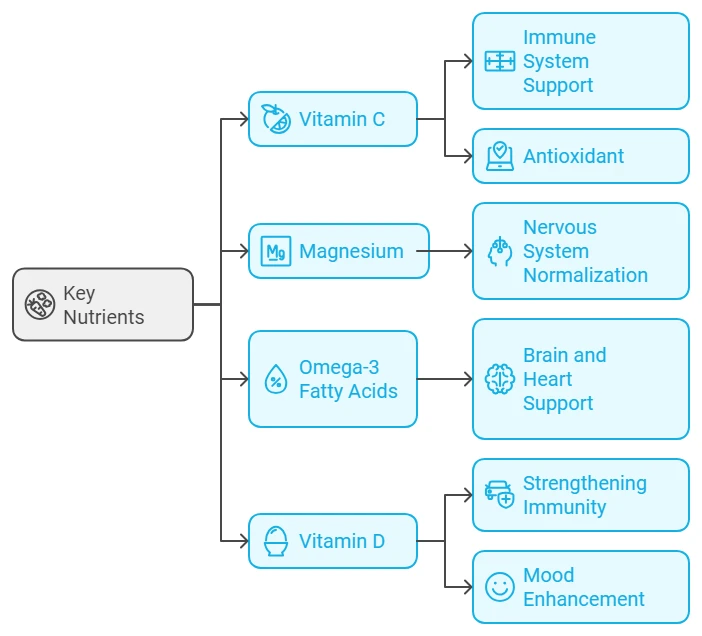
Table 1. The role of key nutrients in maintaining health
| Nutrient | Role in the body | Main sources |
|---|---|---|
| Vitamin C | Immune system support, antioxidant | Citrus fruits, broccoli, berries |
| Magnesium | Normalization of the nervous system | Nuts, seeds, herbs |
| Omega-3 fatty acids | Support for brain and heart activity | Fish, flaxseed oil, walnuts |
| Vitamin D | Support of immunity, improvement of mood | Fish, egg yolks, fortified foods |
Research and data
A 2021 study from Ohio University found that people who take nutraceuticals with antioxidant properties, such as vitamin C and vitamin E, have lower levels of cortisol (a stress hormone) than those who do not.
This emphasizes the role of nutraceuticals in reducing the effects of stress on the body.
Another study published in the journal Nutrients showed that magnesium intake reduces symptoms of depression and anxiety in people experiencing chronic stress.
This is especially important for those who live in conditions of constant nervous tension and overload.

Benefits of regular intake of nutraceuticals and vitamins
Regular intake of nutraceuticals has a comprehensive positive effect on the body, helping it to adapt to daily stress and recover from physical and emotional challenges.
Nutraceuticals are important biologically active substances that are involved in maintaining health at the cellular level, as well as helping to restore energy reserves, normalize the functioning of body systems and improve overall tone.
The effect of vitamins and nutraceuticals on the body’s recovery:
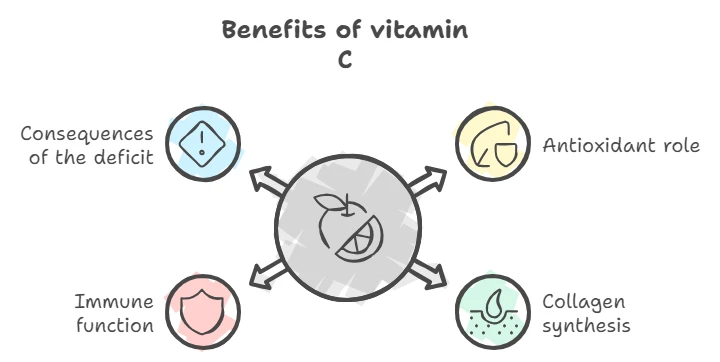
Vitamin C:
It is a powerful antioxidant that neutralizes free radicals formed in the body under the influence of stress and physical activity.
Vitamin C also plays a key role in the synthesis of collagen, a protein responsible for tissue repair and maintaining the structure of the skin, joints, ligaments and blood vessels.
Its deficiency leads to slower tissue healing and reduced immunity, which is especially important in conditions of constant stress and overload.
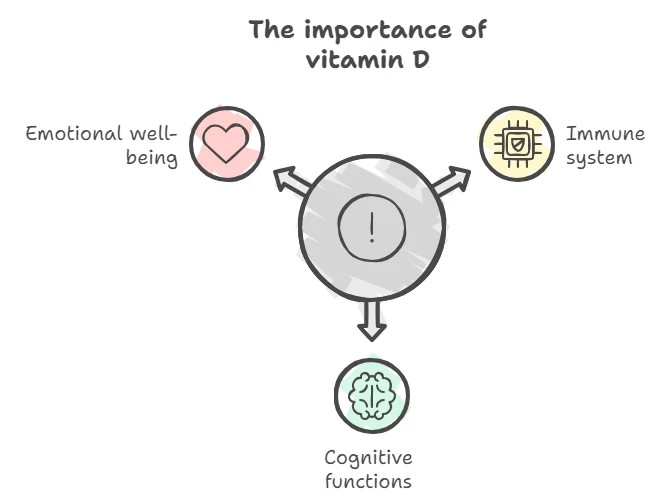
Vitamin D:
Vitamin D regulates the immune system, improving the body’s ability to fight infections and inflammation.
Vitamin D deficiency can lead to cognitive impairment, increased risk of depression, and impaired immune system function.
In times of stress, vitamin D is especially important for maintaining overall psycho-emotional well-being and protecting the body from infections when the immune system is weakened.
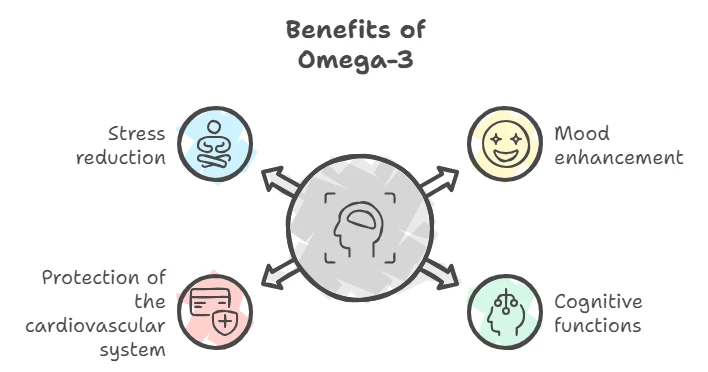
Omega-3 fatty acids:
These essential fatty acids play an important role in protecting the brain and cardiovascular system.
Omega-3s help maintain healthy cell membranes, improve blood circulation, and reduce inflammation, which can be exacerbated by stress.
They also help improve mood and cognitive function, reducing anxiety and depression.
Regular intake of omega-3 fatty acids protects the brain from stress-related damage and helps maintain mental clarity.
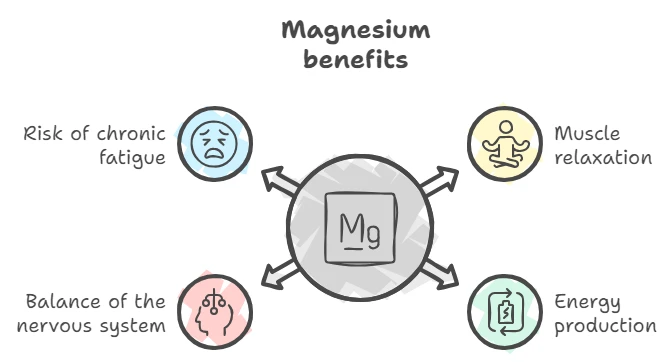
Magnesium:
Magnesium is one of the key minerals responsible for muscle relaxation and normalization of the nervous system.
It is involved in energy production, which makes it indispensable in conditions of increased stress. Magnesium deficiency can lead to muscle spasms, nervous tension, fatigue, and irritability.
Regular intake of magnesium helps to restore the balance of the nervous system, maintaining calmness and reducing the risk of chronic fatigue.

How nutraceuticals help you recover from physical and emotional stress:
Under conditions of increased physical and emotional stress, the body needs additional resources to recover.
Vitamins and nutraceuticals act as a kind of “fuel” for cells, helping them to recover faster and reduce the level of damage caused by stress.
When the body is constantly exposed to negative factors, such as overwork, stress, or intense physical activity, important biochemical processes can slow down.
Nutraceuticals help to restore energy, strengthen protective functions and normalize metabolism.

For example:
- Magnesium reduces muscle tension and prevents cramps after exercise.
- Vitamin C accelerates cellular repair after stress-induced damage.
- Omega-3s support cognitive function and protect nerve cells from the damaging effects of stress.
Thus, regular intake of nutraceuticals helps the body not only cope with current stresses, but also prevents exhaustion, maintaining overall health at a high level, which is especially important in conditions of prolonged stress and increased demands on the physical and psycho-emotional state.
Table 2: The impact of regular vitamin intake on the body
| Vitamin | Effects on the body | Research |
|---|---|---|
| Vitamin C | Reducing cortisol levels, antioxidant | Ohio University, 2021 |
| Magnesium | Reduced anxiety and depression | Nutrients Journal, 2021 |
| Omega-3 | Reduction of inflammatory processes | European Nutrition Association, 2019 |
| Vitamin D | Improving mood, supporting immunity | Harvard Medical School, 2020 |
Key findings and recommendations
For the body to successfully cope with stress and increased workloads, it is necessary to take a careful approach to nutrition and lifestyle.
Nutraceuticals and vitamins play a key role in this process, helping to restore balance and promote health.
Regular inclusion of vitamins in the diet, the use of supplements as needed, effective stress management and timely consultations with a doctor will help to preserve energy, increase stress resistance and improve overall well-being.



